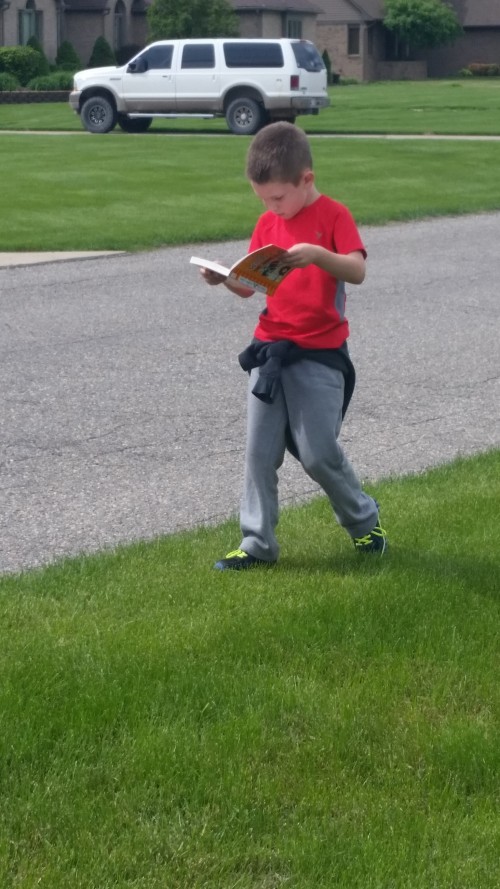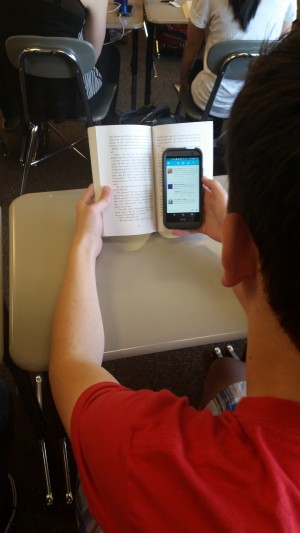So…this happened the other day at my house. My kindergartner couldn’t put his book down long enough to go get the mail:
Oh, be still my English-teacher-Mama heart.
He had a phenomenal first year of school this year, and I’ll never be able to thank his teacher, Irene Settle from Salem Elementary in South Lyon, enough. He’ll read all summer; I’m sure of it.
The next day, this happened in my own classroom:

This young man has been actively fake-reading all year long. He expends more energy figuring out ways to trick me into thinking he is reading than it would take to Just.Read.A.Book. He will not read at all this summer; I’m sure of it.
How do I change that? How do I capture some of my son’s new reader wonder and share it with my teenage students who still view reading as something to be avoided?
This year has been a journey in independent reading for me. I started the year ready to train up an Army of Book Nerds. By November, we were a little battle-worn and I reflected on some of the challenges I was facing. Then the year got really hairy (doesn’t it always), and I stopped blogging about my journey. Had I continued, I would have shared this: It stayed messy. It stayed imperfect.
I asked my students for year-end thoughts about independent reading and they said things like this:
“This class has definitely reignited my passion for reading; before this year, I had only read books that were assigned in school. This year I read countless other books like The Kite Runner and Inferno.”
“I look forward to silent reading. My schedule is pretty busy so knowing that I get at least a few minutes to read everyday makes me happy and relieved.”
“It cheers me up and helps clear my brain.”
I wish I could just swoon a little, pat myself on the back and be done with it.
But my fake reader is still there with his phone in his book. And some of his classmates tell me things like this:
“Reading is still a struggle. I can’t find books I like. If I do, I just can’t drag myself into it.”
“Reading every day is just too much.”
“Meh.”
Can I make a last ditch effort to encourage summer reading with students who feel like this?
There is a long established tradition in high schools of assigning summer reading. Some schools require it every year. Some have extensive lists. I, myself, assign it in my AP Language class. And it is so, so important that kids read over the summer. Here’s what the research says:
- All young people experience learning losses when they do not engage in educational activities during the summer. Research spanning 100 years shows that students typically score lower on standardized tests at the end of summer vacation than they do on the same tests at the beginning of the summer (White, 1906; Heyns, 1978; Entwisle & Alexander 1992; Cooper, 1996; Downey et al, 2004).
- The achievement gap in reading scores between higher and lower income students increases over summer vacation. The research shows that achievement for both middle-and lower-income students improves at a similar rate during the school year. (Alexander & Entwisle, 1996).
- Reading just 4-5 books during the summer can prevent a decline in a child’s fall reading scores. (Kim, Summer Reading and the Ethnic Achievement Gap, 2004)
But I’m not sure assigning summer reading works. *small, timid, true voice* I know it doesn’t work for some.
So what’s a girl to do?
- Don’t give up–not on any of them. That kid who fake read all year? He’s getting a special list from me. And I emailed it to his mom. He might not read, but no one is going to accuse me of not trying.
- Take them outside to read in the sunshine. All they want to do is GET OUT OF SCHOOL. So scrap your lesson one day this week, take ‘em outside and let them read. Most of my kids have independent novels they’re reading, but for those that don’t, I’m going to copy the first 5-10 pages of some different, high interest books and have them read those. Maybe someone will get hooked.

- Enlist the parents. Having a kindergartner has been eye-opening for me. I’ve always thought I’m pretty good with communication, but I never really thought about how rarely I ask my parents for help. I drafted a letter home offering suggestions for summer reading and offering my suggestions for books that might hook their students.
- Give students lots of suggestions. I’m planning an end of the year reading party in the last week of school. Teachers from other departments are coming in to give a quick “You have to read this” book talk for the kids, our librarian is doing the same, and I’ve got a few students in each class ready to make their pitches. All the kids will leave with a bookmark of the titles and authors discussed so they can look them up over the summer.
- Connect with the local library. I’ve been pushing Novi Public Library’s summer reading program for a few weeks now and we’ve invited them to stop by our reading celebration.
- Share what YOU are reading this summer. I have a list a mile long and I want them to see it. I want them to see that I’m deliberate about my reading. I’m busy just like they are so I plan out what I’m going to read over the summer. I picked my top ten books that I’m planning to read and I’ll be sharing that list with them over the coming days.
I have 9 days left with these kids. Well, seven full days and two exam half days, but who’s counting? I haven’t reached them all and this last ditch effort probably won’t pick up all my stragglers. But I might get a few more, and at the very least I’ll get an afternoon of reading in the sunshine.
 Hattie Maguire is an English teacher and Content Area Leader at Novi High School. She is spending her fourteenth year in the classroom teaching AP English Language and Composition, English 10, Debate, and Practical Public Speaking. She is a National Board Certified Teacher who earned her BS in English and MA in Curriculum and Teaching from Michigan State University.
Hattie Maguire is an English teacher and Content Area Leader at Novi High School. She is spending her fourteenth year in the classroom teaching AP English Language and Composition, English 10, Debate, and Practical Public Speaking. She is a National Board Certified Teacher who earned her BS in English and MA in Curriculum and Teaching from Michigan State University.
